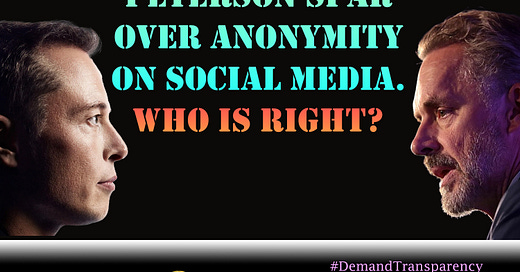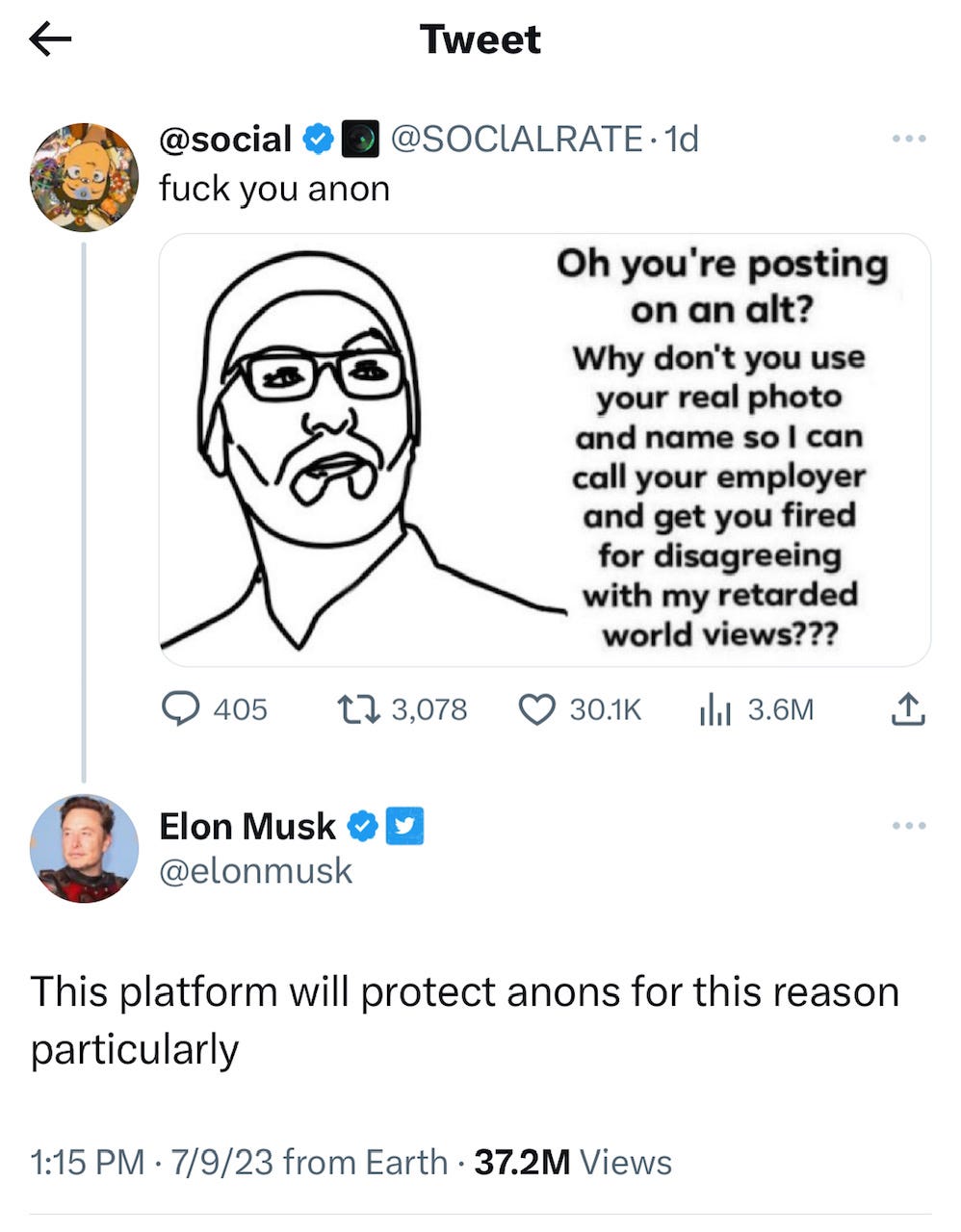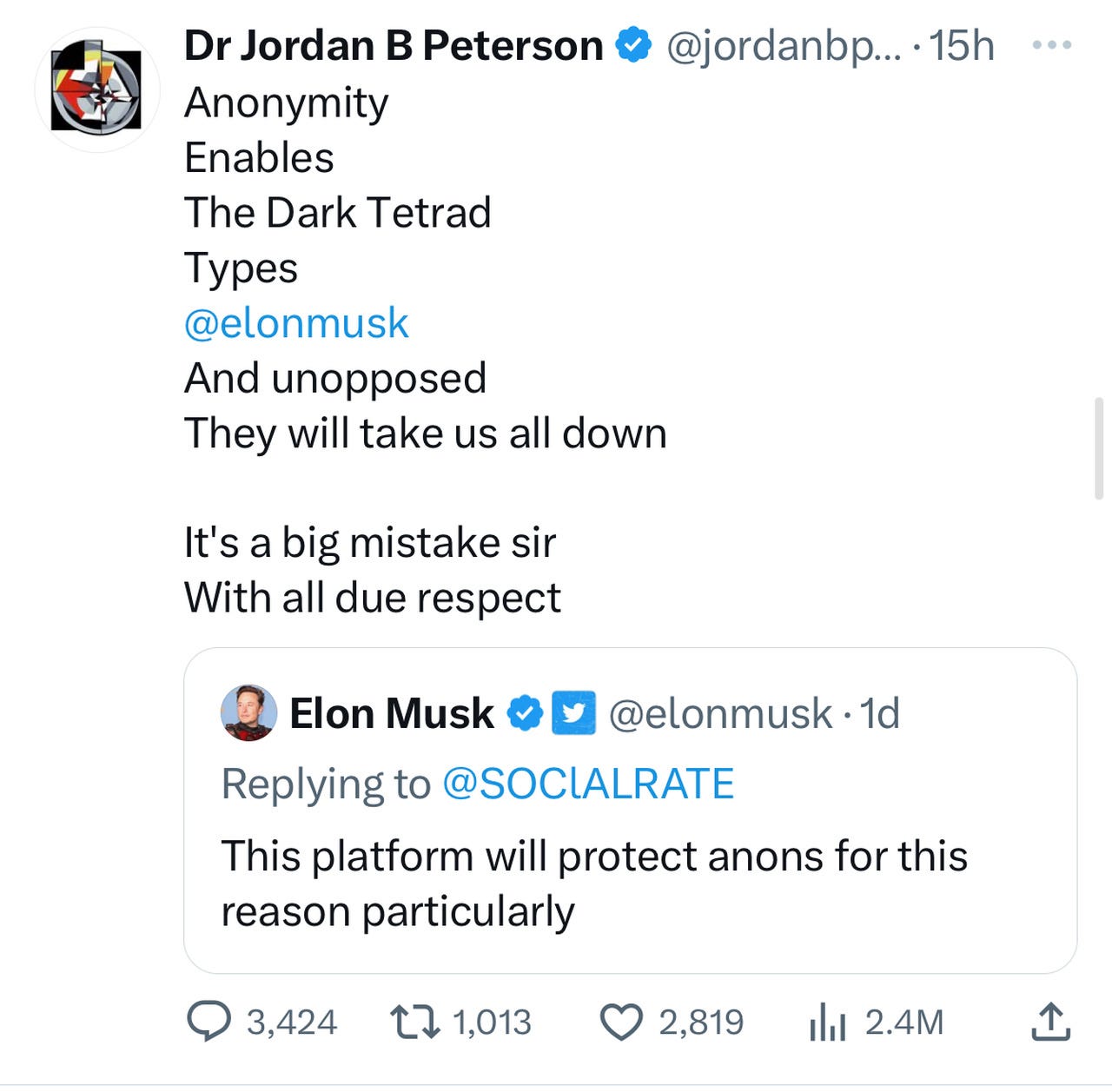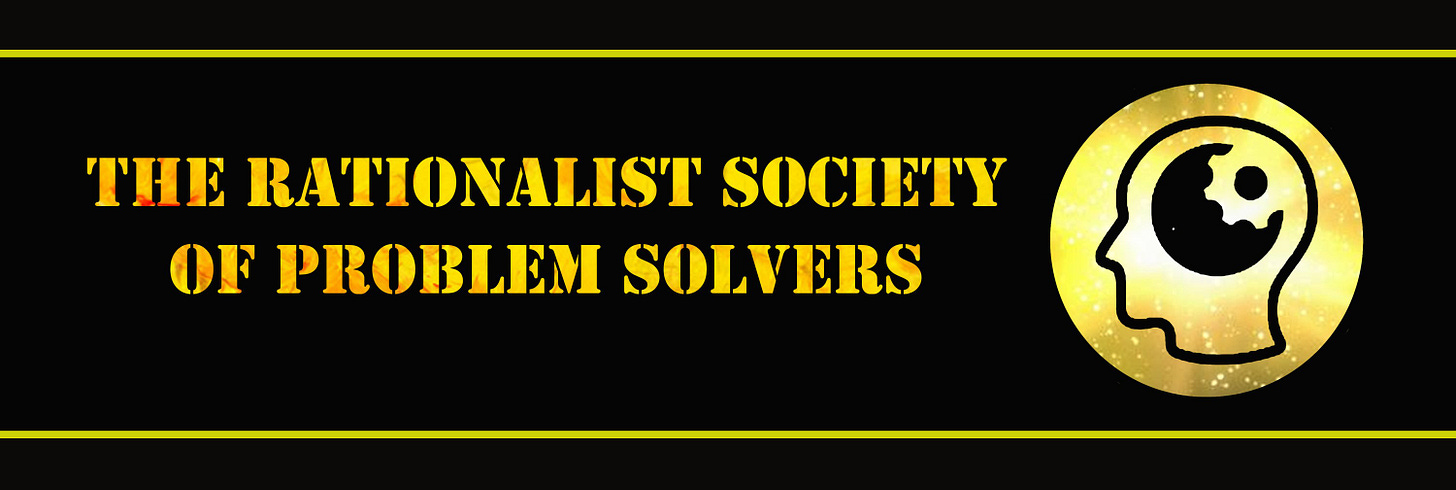On Monday, July 10th, there was an exchange on Twitter between Elon Musk and Dr. Jordan Peterson regarding anonymity vs. trust on social media platforms like Twitter. This is an interesting and nuanced topic that requires further discussion. At its core, the question revolves around how trust can be established on the internet. How can we determine if the other person is not an AI or a paid keyboard warrior disseminating propaganda from a computer farm?
This is an important and essential question to address. Simultaneously, anonymity holds significant value. Many individuals could face negative consequences such as job loss or social ostracism for expressing their opinions on topics like vaccines, transgender issues, guns, race, marijuana use, drug legalization, and more. Anonymity also provides a safe space for shy individuals seeking to meet people in dating, or for those building the courage to come out of the closet, switch political affilitations, or more. It's a complex issue, and some of the exchanges between Musk and Peterson seemed limited in scope - almost parochial (which is rare, especially for Dr. Peterson), lacking sufficient context or deep thought.
Their exchange unfolded as follows:
Interesting, right? Both make some valuable points.
Maybe that's because they are both correct (partially).
Let's start with Elon's view: protecting anonymous people's anonymity on Twitter is important. We can see a lot of value with this view and we list them as follows:
Freedom of Expression: Not in the legal sense, but in the social sense - and sometimes with grave real-world consequences. There are plenty of people who could be fired, disciplined, or ostracized from a peer group for publicly questioning vaccine safety, racial or gender issues, gun control, or abortion policies. (A great thought experiment on this is to think about people who use Instagram accounts under their real names and "Finstagram" accounts (AKA fake Instagram accounts with a pseudonym). It turns out that people on their real accounts are much more likely to post a false image of themselves, showing themselves always happy, working out, eating healthy, traveling, etc. You rarely see the ugly. But on the fake accounts, people don't hold back. Shielded by anonymity, they can say what they really want to say).
Destroying barriers: Anonymity destroys racial, age, sex, and cultural issues. Conversations can often be based purely on merit instead of stereotyping or identity.
Privacy protection: Obvious one here, but it prevents being doxxed, harassed, or physically attacked.
Whistleblowing: Being able to whistleblow anonymously is a massive benefit to society. We desperately need a safe haven for whistleblowers (like we wrote about here).
We also see Dr. Peterson's point very well. He believes Twitter should "oppose" the use of fake names and instead make everyone use their real identities. Why would he want this?
Trust.
At The Rationalist Society of Problem Solvers, we recognize the same problem Dr. Peterson does: the systems that govern over us have been completely corrupted. We write about this often. In order to fix the direction we are heading, we need to stop the corruption and then restore trust in our systems. Trust is the most important thing missing in our society right now, and it starts online. Right now, there's almost no trust in our institutions, our government, our schools, police, medicine, media, justice for criminals, and even in science (what's a woman?). There's a lack of trust all around, everywhere you look. It seems that Dr. Peterson recognizes that you can begin to fix this with transparency, and then he pushes Elon to enforce it on Twitter.
While we agree that transparency is the key to trust, forcing it on people is not the answer. We believe that anonymity needs to be a choice, but one with consequences.
The people who choose to use their real identities online and who speak their truths should be honored as both courageous and transparent. If you choose to be your real identity, that should mean something. The more transparent and vulnerable you are willing to be, the easier it will be for you to gain trust, as it should be. To us, transparency equals trust. However, that doesn't mean that if you are anonymous, you could never earn trust.
There are plenty of ways to earn trust online with anonymous people. In fact, it is done all the time. Here are a few:
Bring valuable information to the discussion. Merit alone can help gain trust. Bring whistleblower information, help solve a case, or write insightful ideas full of imagination or art.
Funding things: If you pay money for something, towards a cause, etc., it gives credence to you. Usually, a bot or AI will not spend money on things. And if they do, that will be traceable and leave a trail. Putting your money where your mouth is builds trust.
Have decentralized trust systems. For example, on Amazon and eBay, we trust other users based on a decentralized rating system that is peer-to-peer. A person can rate you 5 stars, and you can rate them 5 stars, etc. Why don’t we have this on social media?
Come up with other unique ways to build trust. Some ideas we have heard are:
Trust tokens: Imagine crypto tokens that you could give limited amounts to people, and they would all be kept on a blockchain ledger with reviews next to them. We could have a trust “paper trail” on chain. This could be for anything from real-life trustworthy acts to digital ones. Help someone code a project, and they could give you a trust token. Know someone in real life? Trust token. Lend someone money and they pay you back? Another token. There could also be negative tokens as well for scoundrals.
Other ways to verify: Send postcards to mailing addresses with QR codes on them to be entered into the system. This is what Google does to ensure new business locations are real, and it works amazingly well. Or have people record certain acts in video, or audio, that are obscure and hard to fake with AI and post them to a decentralized checking system. Finger paint a smiley face. Plant a red flower. Etc.
Let users be able to challenge other users as to their validity with things humans are much more suitable for than AI. Especially if many people suspect a user is fake. For example, request that they shoot a video in real time drawing something odd and specific (see #2).
Collaborate with people online on projects and missions and rate each other after.
If you are a real person and know another real person in real life, there should be a way to vouch for them.
If you make a purchase from someone and it goes well, same thing. That’s a form of vulnerability and trust.
The ideas for better trust online are endless.
In reality, trust is a sliding scale. Think about how trustworthy some of the closest people are in your life. They don't all rate the same level of trust. The digital space should be no different. We should attempt to measure trust as accurately as possible. We wrote about this extensively in one of our all-time favorite articles here, where we describe building digital platforms for human collaboration on real world projects.
In the end, we should find ways to add trust to people's avatars online, but we should not censor anonymity. Both have value. But if you want to be anonymous, then trust might be an uphill battle.
Another thing to consider is that you could also have exclusive groups online that require people to be their real selves to join. Think tanks or hives could be set up like this. Just like when you apply for a job, you need ID and validation to work, different groups could hold different standards. Some could allow for anonymity, but some don’t have to. Then see what groups get more accomplished.
In conclusion: in a space as general as Twitter, both standards should be accepted. And that standard should remain the choice of the user.
The trustworthiness of any digital person should never be left up to a centralized entity though. We are STRONGLY opposed to any centralized trust systems, as that would be much like the dreaded social credit systems of China. Instead, we are all for truly decentralized and transparent ones. And if you don't understand the difference or want to push back against this, please read this article “Embrace Decentralized Systems. Fear Centralized Ones. Know The Difference,” because any pushback simply means you don’t understand the real power of decentraliztion (we say this in a loving and encouraging way).
Thanks for reading!
NOTE: After we finished this article, we saw that Eric Weinstein had made a post that we strongly agreed with and complemented our article well, and we wanted to share here:
As always the entire purpose of The Rationalist is to connect with other solutions-minded results-driven people like yourself!
For over 3 billion years on this planet there were only single-celled organisms. Then one day they somehow learned to work together and make complex multi-celled creatures . Right now we are like those single-celled organisms. Our next evolution is finding how to work together, better… (like we wrote about here).
#KillCorruption #UnifyAgainstCorruption #CleanSlate #ResultsMatterMost #DecentralizeEverything #DemandTransparency
COMMENTS ARE FOR EVERYONE AS A PLACE TO THINK-TANK SOLUTIONS. They will never be for paid-only subscribers and we will never charge a subscription.









It is very nuanced, to be sure, but I have to say I agree with Musk far more than Peterson on this.
Guys, I'm on a huge reading schedule for a father of two with a small mortgage and off-grid etc. I'm time poor but I've kept you subscribed and sometimes check in. This time I am so glad. I believe this piece is incredibly important and I thank you for the time and thought behind it. As a musician I am torn with 'coming out of the closet' as a free-thinker and critical thinker with my music and tempted to self-censor just to get algorithms to side with me. This issue is huge and I feel you guys have given some real solutions here. Anonymity for my political views is good but transparency for my party music is good as both protect my interests of self-expression and self-employment.
Strange times.
Right now my trust horizon doesn't go much past my kitchen sink.
Congrats
Here is my shadow banned song on Bankers and Lockstep for you entertainment
https://www.youtube.com/watch?v=mmAhPm8deMs